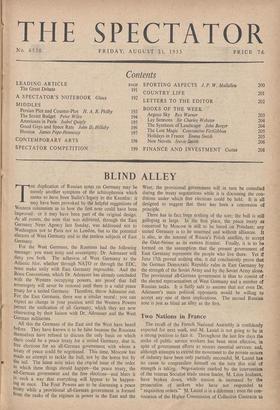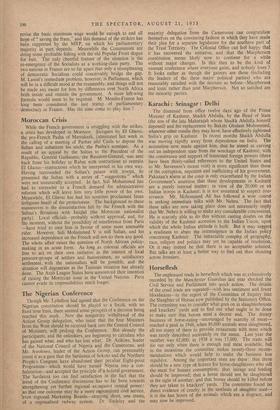Two Nations in France
The recall of the French National Assembly is confidently expected for next week, and M. Laniel is not, going to be in a strong position to face it. Throughout the last few days the strike of public service workers has been most effective, in spite of government efforts to restore essential services; and, although attempts to extend the movement to the private sectors of industry have been only partially successful, M. Laniel has no cause to congratulate himself on the turn this trial of strength is taking. Negotiations marked by the intervention of the veteran Socialist trade union leader, M. Leon Jouhaux, have broken down, while tension is increased by the prosecution of strikers who have not responded to requisition orders." M. Laniel is in a dilemma : even the con- vocation of the Higher Commission of Collective Contracts to revise the basic minimum wage would be enough to end all hope of " saving the franc," and this demand of the strikers has been supported by the MRP, on which his parliamentary majority in part depends. Meanwhile the Communists are doing some profitable fishing with the old Popular Front slogan for bait. The only cheerful feature of the situation is the re-emergence of the Socialists as a working-class party. The two nations in France are so far apart that only a strengthening of democratic Socialism could conceivably bridge the gap. M. Laniel's immediate problem, however, is Parliament, which will be in a difficult mood at the reassembly, and things will not be made any easier for him by differences over North Africa both inside and outside the government. A more left-wing formula would seem to be required. M. Mendes-France has long been considered the last trump of parliamentary democracy in France. Has the time come to play him



























 Previous page
Previous page